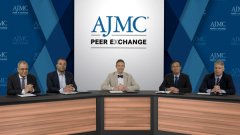
Evaluating Clinical Pathway Implementation in HCC Treatment
A panel of medical experts open a discussion surrounding key treatment strategies in management of hepatocellular carcinoma (HCC).
Episodes in this series

The panel discussion centered on the key theme of optimizing treatment strategies in hepatocellular carcinoma (HCC) and the efficient allocation of resources for improved patient outcomes. Ryan Haumschild, PharmD, MS, MBA, director of pharmacy services at Emory Healthcare and Winship Cancer Institute, moderated the discussion. The esteemed panel included Martin F. Dietrich, MD, PhD; Mohamed Salem, MD; Ghassan Abou-Alfa, MD, MBA; and Richard Kim, MD, each experts in the field of oncology and hepatocellular carcinoma management.
The session commenced with a brief introduction by Haumschild, highlighting the focus on clinical pathways in HCC management and the analysis of their benefits in standardizing treatment and resource allocation. Dr Dietrich emphasized the evolution of HCC treatment from 1 drug to a complex array of options, necessitating the use of clinical pathways to manage the diverse treatment strategies. He underscored the importance of these pathways in streamlining evidence-based treatment evaluations, ensuring patient safety, and addressing financial considerations. Although acknowledging the need for individualized care, he emphasized the role of clinical pathways in standardizing treatment protocols across different care settings, not as a replacement for tailored patient care, but as a complementary tool to optimize patient outcomes.
Dr Kim elaborated on the data-driven nature of clinical pathways and their role in enhancing consistency and quality of care. While acknowledging the benefits, he pointed out several limitations, including the lack of personalization, the need for updated information in line with ongoing research, and the importance of incorporating patient preferences in treatment decisions. He emphasized that clinical pathways, while valuable, should not restrict innovative thinking and the consideration of unique patient circumstances.
The discussion further delved into the complexities of treatment decision-making, especially in instances where patients may have preferences for specific treatment modalities, such as oral versus IV therapy. Dr Kim emphasized the significance of considering patient-specific factors, such as transportation vulnerabilities and other social determinants of health, to ensure the effective implementation of treatment plans.
Overall, the panelists underscored the importance of clinical pathways as a guideline to streamline treatment decisions and optimize resource allocation while acknowledging the need for flexibility to accommodate individual patient needs and preferences. The conversation highlighted the continuous need for updated information and the importance of considering a holistic approach to patient care, encompassing not only medical considerations but also social and logistical factors for comprehensive treatment management in HCC.
Video synopsis is AI-generated and reviewed by AJMC editorial staff.
Newsletter
Stay ahead of policy, cost, and value—subscribe to AJMC for expert insights at the intersection of clinical care and health economics.









